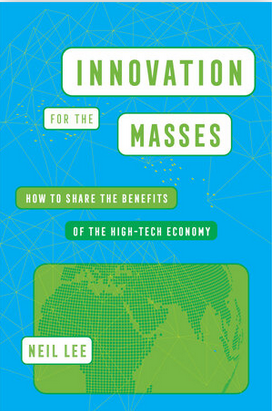
Neil Lee (2024), University of California Press, 229 p. – COBIB.SI
Publisher’s About the Book & Reviews:
An engaging, solutions-oriented look at how cities and nations can better foster innovation and equality.
From San Francisco to Shanghai, many of the world’s most innovative places are highly unequal, with the benefits going to a small few. Rather than simply asking how we can create more high-tech cities and nations, Innovation for the Masses focuses on what we can learn from places that foster innovation while also delivering the benefits more widely and equally. In this book, economist Neil Lee draws on case studies of Taiwan, Sweden, Austria, and Switzerland to set out how innovation can be successfully balanced toward equity.
As high-tech economies around the world suffer from polarized labor markets and political realities that lock in these problems, this book looks beyond the United States to other models of distributing a leading-edge economy. Lee emphasizes the active role of the state in creating frameworks to ensure that benefits are broadly shared, revealing that strong policies for innovation and mutual prosperity reinforce each other. Ultimately, Innovation for the Masses provides a vital window into alternative models that prioritize equity, the roadblocks these models present, and what other countries can learn from them going forward.
“In a departure from the usual discourse, which is often about creating more high-tech nations, Lee (economic geography, London Sch. of Economics) looks at how to harness innovation, especially in the tech sector, to improve the lives of a broad swath of society . . . Effectively shows the importance of innovation in modern economies while also making clear that innovation alone does not guarantee good outcomes.”—Library Journal
“The book brings much-needed nuance to the debate about how to foster an entrepreneurial culture that lifts broader society as well as industry.”—Financial Times
“Put Silicon Valley and Boston on the back burner. . . . Innovation for the Masses, by Neil Lee, professor of economic geography at the London School of Economics – recently included by the Financial Times among its best new books on economics – offers a message on how universities can help create good jobs for their regions.”—Times Higher Education
“This marvelous book offers a deep understanding of the (very different) ways in which innovation works in Switzerland, Sweden, Austria, and Taiwan. The four countries examined have institutions and policies that spread the benefits of their innovative sectors widely across their populations; unlike most other successful innovators, they also produce decent societies. Distinguished from the many books on innovation I’ve read in recent years, Neil Lee’s work presents a thought-provoking set of ideas and is sure to have a great impact—the samizdat version already has.”—David Soskice, coauthor of Democracy and Prosperity: Reinventing Capitalism through a Turbulent Century
“In this exquisitely researched book, Lee offers hope: hope in the ability to foster innovation that promotes widely shared prosperity for all. Looking at the cases of four equitable innovators—Switzerland, Austria, Taiwan, and Sweden—the book offers lessons that should be well heeded by policymakers worldwide.”—Dan Breznitz, author of Innovation in Real Places: Strategies for Prosperity in an Unforgiving World
“Policymakers too often grasp at buzzwords and on-trend ideas. We can do better, and this book is a crucial tool in the job of improving economic policy. Growth and innovation in our economy must have as their central goal the improvement of people’s living standards. Lee’s analysis is a vital explanation of new evidence on how that can happen. All who care about improving public economics should read it.”—Alison McGovern, MP, Shadow Minister for Employment
“A book for policymakers, practitioners, and anyone tasked with pursuing innovation-inspired development strategies. Combining innovation-driven growth with mechanisms by which this growth is distributed among more people, Lee brings academic work closer to those who can actually do something to change practices in the real world.”—Josephine Rekers, Senior Lecturer of Human Geography, Lund University
“A wonderful read. Lee shows the fundamental importance of linking innovation and equality.”—Teis Hansen, Professor of Innovation and Entrepreneurship, University of Copenhagen